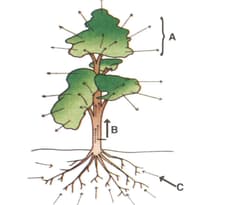Transport in the Xylem of Plants
Transport in the Xylem of Plants: Overview
This Topic covers sub-topics such as Xylem, Stomata, Transpiration, Xerophytes, Transpiration Pull, Adaptations in Desert Plants, Potometer, Active Transport in Plants, Cohesion-Tension-Transpiration Pull Model and, Adaptations in Halophytes
Important Questions on Transport in the Xylem of Plants
Transpiration is the main driver for the movement of water in the xylem.
Ganong's Potometer measures the rate of water absorbed by the plants.
A device used for measuring the rate of water absorption by stem is called
Explain in detail the mechanism of water movement in the leaves with the help of a neat and labelled diagram.
What do you understand by the process of transpiration? List at least five advantages of transpiration.
How does transpirational pull help in the absorption of water by the plants?
Mark the correct statement.
An outline sketch of a tree is shown in a diagram below. Study the name and answer questions that follows

Name and define the phenomenon labelled A in the diagram.
How would you justify the statement that transpiration contribute bringing rain?
How will the following conditions affect transpiration?
Still air
From the following list pick out the parts through which the water vapour of transpiration leaves the leaf and rearrange them in a proper manner.
Xylem Vessels, mesophyll cells, stoma, intercellular space and substomatal space.
Transpiration is best defined as _____.
Distinguish between the following pair
Transpiration and evaporation
Define the following term.
Wilting
Define the following term
Transpiration
Give a suitable explanation for the following
Some plants show wilting of their leaves at noon even when the soil is over watered.
Give suitable explanation for the following:
Excessive transpiration results into wilting of the leaves.
Rewrite the false statement in (a) above in the correct form.
Most transpiration occur at midnight.
Transpiration creates a pull for upward movement of the sap
Most transpiration occur at night.
